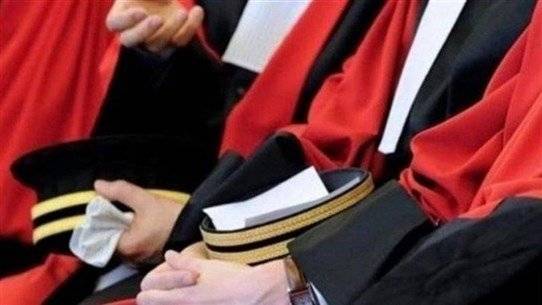The new judicial year in Lebanon begins tomorrow, amidst the ongoing strike of the judges, which has entered its second month, due to the financial, social, and health crises that judges are experiencing, alongside the absence of sustainable solutions. However, a door has opened for a partial solution that could lead to a significant increase in judges' salaries and potentially end the open-ended strike. This attempt, however, faces outright rejection from the majority of judges, particularly the "Judges' Club of Lebanon," which opposes a solution that "constitutes an insult to judges instead of addressing their grievances."
In response to the outcry raised by the Head of the Beirut Bar Association, Nader Kassar, who threatened to no longer remain silent about the halt to the course of justice and the harm to the interests of lawyers and their clients, and in light of indications of growing security instability manifested in either repeated assaults on banks or theft and armed robbery occurring in broad daylight, a prominent judicial source announced that "next week will witness a temporary solution to the strike crisis, which does not meet the aspirations and demands of the judges."
The source revealed to "Asharq Al-Awsat" that "dozens of judges received calls from the Ministry of Justice requesting them to sign a petition urging the Governor of the Central Bank of Lebanon, Riad Salameh, to calculate judges' salaries at an exchange rate of 8,000 Lebanese pounds per dollar, instead of the currently applied 1,500 pounds, which would raise the value of their salaries fivefold." This initiative "is accepted by some and firmly rejected by the majority, who demand a permanent resolution to the crisis."
This initiative would raise judges' salaries approximately five times, as the average salary for a judge currently stands at six million pounds, which was equivalent to four thousand dollars when the rate was 1,500 pounds per dollar, but is now equivalent to just 140 dollars since the exchange rate has reached 38,000 pounds. Thus, if the four thousand dollars are calculated at the rate of 8,000 pounds per dollar, the salary would rise to 32 million Lebanese pounds, around 900 dollars at the current exchange rate.
Opinions within the judicial body are divided, with some insisting on continuing the strike while others wish to ease its severity and return to work partially. The judicial source indicated that a large number of judges "prefer to return to work on a rotating basis for one or two days a week to handle essential and urgent files, especially those involving detainees and cases at risk of being dismissed due to the passage of time." It was noted that "dozens of judges have lowered the high bar of demands they raised at the announcement of the strike, particularly during the general assembly of judges that took place with the presence of the President of the Judicial Council, Judge Suhail Abboud, especially if there is reconsideration of the financial salary situation, and improvement of medical and educational provisions for them and their children."
This initiative, seen by some as a way out of the crisis, reduces the embarrassment and blame directed at the judiciary. However, it has been firmly rejected by the "Judges' Club of Lebanon," which believes that "the call for judges to sign a petition urging the Central Bank Governor (Riad Salameh) to pay judges' salaries at the rate of 8,000 pounds is a further humiliation to judges; especially since most of them rejected this proposal two months ago, considering it a financial bribery from the central bank governor, a barter on the files he is being pursued in front of the judiciary."
One member of the "Judges' Club" announced that "there are those promoting a partial or complete end to the strike." He confirmed to "Asharq Al-Awsat" that "Judges' demands are not solely financial." He said that "the primary demand of judges lies in the law of judicial independence." He pointed out that "the dire consequences of preventing judicial independence are now reflected in the disruption of judicial formation decrees, hindering the investigation into the Beirut port explosion case, and the blatant political interventions in judicial decisions."
The judge, who preferred to remain anonymous, stated that "the Judges' Club is not inclined to lift the strike unless there is a sustainable solution to the crisis." He added, "We refused the mechanism of paying salaries at the rate of 8,000 pounds in July because it is illegal, and we refuse it today for the same reasons, and we will not accept a solution that constitutes an insult to judges." He asked, "If we solve the judges' crisis, what do we do with the judicial assistants? Can a judge resume work if the staff remains on strike and has not received their rights?"




